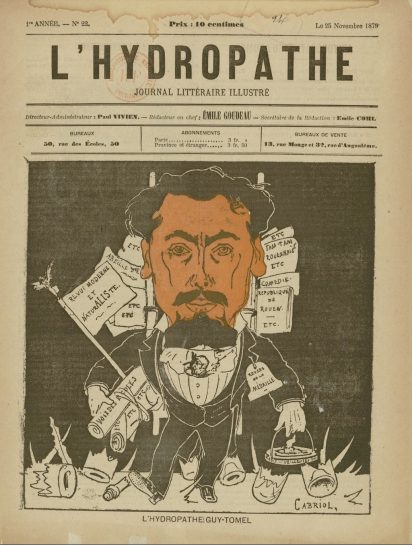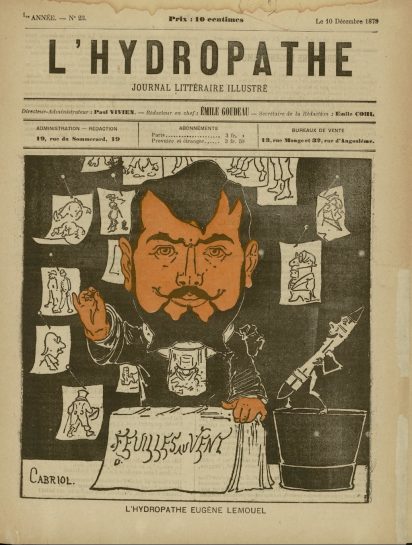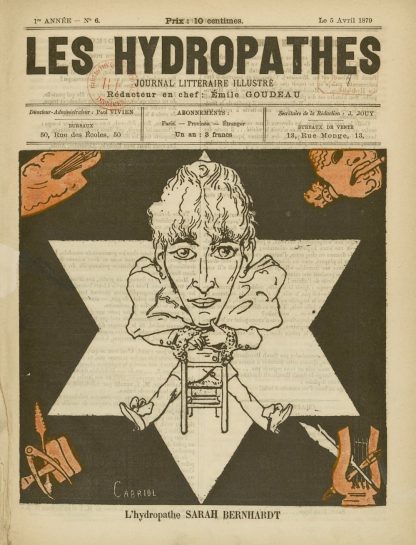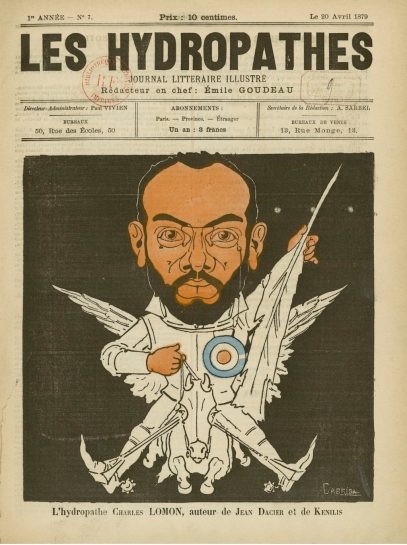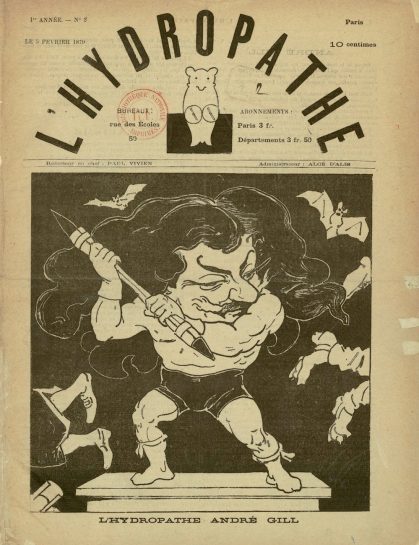
The Hydropathes, a literary club whose motto could have been “drink in every word”
This is perhaps one of the best-kept secrets of Rue Cujas. One hundred and forty years ago, a whimsical group of artists, poets and students united in their love of words – and their dislike of water – decided to meet up every Friday evening on the first floor of a café on the corner of Rue Cujas and Boulevard Saint-Michel.
Led by the author and poet Emile Goudeau, this club of revellers and thinkers would recite poetry, comment on the latest literary news and play music, an activity that would endear them with the local youth, but create friction with the café’s neighbours. Goudeau therefore suggested the club become more organised and find its own premises. At the end of 1878, the Cercle des Hydropathes officially saw the light of day at 19 Rue Cujas.
But what about its name? In fact, it all started with a schoolboy pun on the name of the club’s president and the place where its members found refuge. Hydropathes in French refers to people who hate water or whom it makes ill: Goudeau sounds like the “taste of water”, whereas Hôtel Boileau sounds like “drink water”. Perhaps the name is also an ironic nod towards their penchant for boozy conversations; some experts suggest that it is perhaps a tribute to a German waltz, whereas other people, such as the illustrator Samuel Eckert, think that it is in fact a reference to an animal with a scaly body and lots of legs.
In just a few months, the literary circle became one of the most popular of its kind in Paris. At the start of 1879, the Hydropathes had up to three hundred and fifty members including the actress Sarah Bernhardt, illustrator André Gill, humourist Alphonse Allais and even a member of the French Academy, Paul Bourget. To keep a trace of their writings, Goudeau threw himself into an ambitious project and set out to publish the circle’s very own poetry review. Once again the idea met with immediate success.
“I think I was probably twenty-one when I asked to become a member of the Club des Hydropathes”Francisque Sarcey
“I think I was probably twenty-one when I asked to become a member of the Club des Hydropathes”, writes the journalist Francisque Sarcey in the first edition of the periodical published in January 1879. His enthusiasm is easy to understand: for thirty issues or so L’Hydropathe presented a joyous literary jumble with a mix of romantic poems, disjointed short stories, social-cultural demands, biographies of the club’s members, salacious jokes and, of course, eulogies to the joys of drinking. And the content is still very readable: why not see for yourself, the Bibliothèque Nationale de France now provides free access to the review’s archives.
It should come as no surprise that the circle’s disappearance made as big a splash as its creation. In 1880, Goudeau left the group after some of its members set off fireworks behind the room where the Hydropathes used to meet causing panic amongst those present. What end could be more fitting for a poetry circle that made such a loud impression on the Parisian cultural scene than an explosion of light and sound. And yet their philosophy lives on and has never been so pertinent. Here is an extract of their dogma that was published in the first issue of L’Hydropathe:

Le premier numéro de la revue L'Hydropathe
The doctrine of the Hydropathes consists in not having one. Talent is welcomed with open arms, wherever it comes from and whatever form it takes. The audience brought together here judges in silence. It likes some and hates others. You only need to come along to be admitted because the audience is our ultimate judge: there is only one Supreme Court – which we call posterity – but it is rarely in session during the author’s lifetime.
Freedom, open-mindedness and letting the people judge for themselves… More than a century after their disappearance, the spirit of the Hydropathes lives on. We humbly invite you to contribute to keeping it alive in the, Salon des Hydropathes, a fully-equipped conference room at 18 Rue Cujas.
